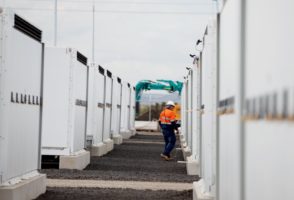Scientists have found a way to produce thin, flexible and low-cost batteries using waste materials from the billions of single-use face masks that would otherwise wind up in landfill, as the world enters its third year of the Covid-19 pandemic.
In a paper published in the Journal of Energy Storage this month, researchers from the National University of Science and Technology in Russia (NUST MISiS), with colleagues from the US and Mexico, used medical waste to create solid-state supercapacitors.
According to the paper, the scientists repurposed used face masks into “highly efficient textile supercapacitors,” and used waste drug blister packs as a shell, thus forming the basis for creating batteries.
The researchers said disposable face masks, in particular, had proven to be easier and cheaper to process than other waste materials used in previous experiments, which had required high-temperature charring in special furnaces.
The masks – which have been creating huge amounts of polymer waste over the course of the pandemic – required only graphene saturation to give them unique energy storage properties, the researchers said.
According to Professor Anvar Zakhidov, scientific director of the project at NUST MISiS, the masks are first disinfected with ultrasound, then dipped in ‘ink’ made of graphene, which saturates the mask.
The material is then compressed and heated to 140°C – far lower temperatures than required for conventional supercapacitor batteries – before a separator, also made of mask material, is placed between the two electrodes.
This is then saturated with a special electrolyte, and then a protective shell is created from the material of medical blister packs, such as are used to store paracetamol.
The team said the resulting batteries had a high density of stored energy and electrical capacity, of up to 98 watt-hours/kg, which puts them in the ball-park of the current average lithium-ion batteries.
When scientists added nanoparticles of inorganic perovskite of CaCo oxide type to the electrodes made from the masks, the capacity of the batteries was further increased to up to 208 watt-hours/kg).
The team said the mask-derived batteries were “superior in several ways” to heavier, metal-coated conventional batteries, which had greater manufacturing costs and did not have the added benefit of diverting polymer waste from landfill.
At this stage, the batteries can be used in household appliances from clocks to lamps, but the researchers say they plan to apply the new technology for the production of batteries for electric cars, solar farms and other applications.








